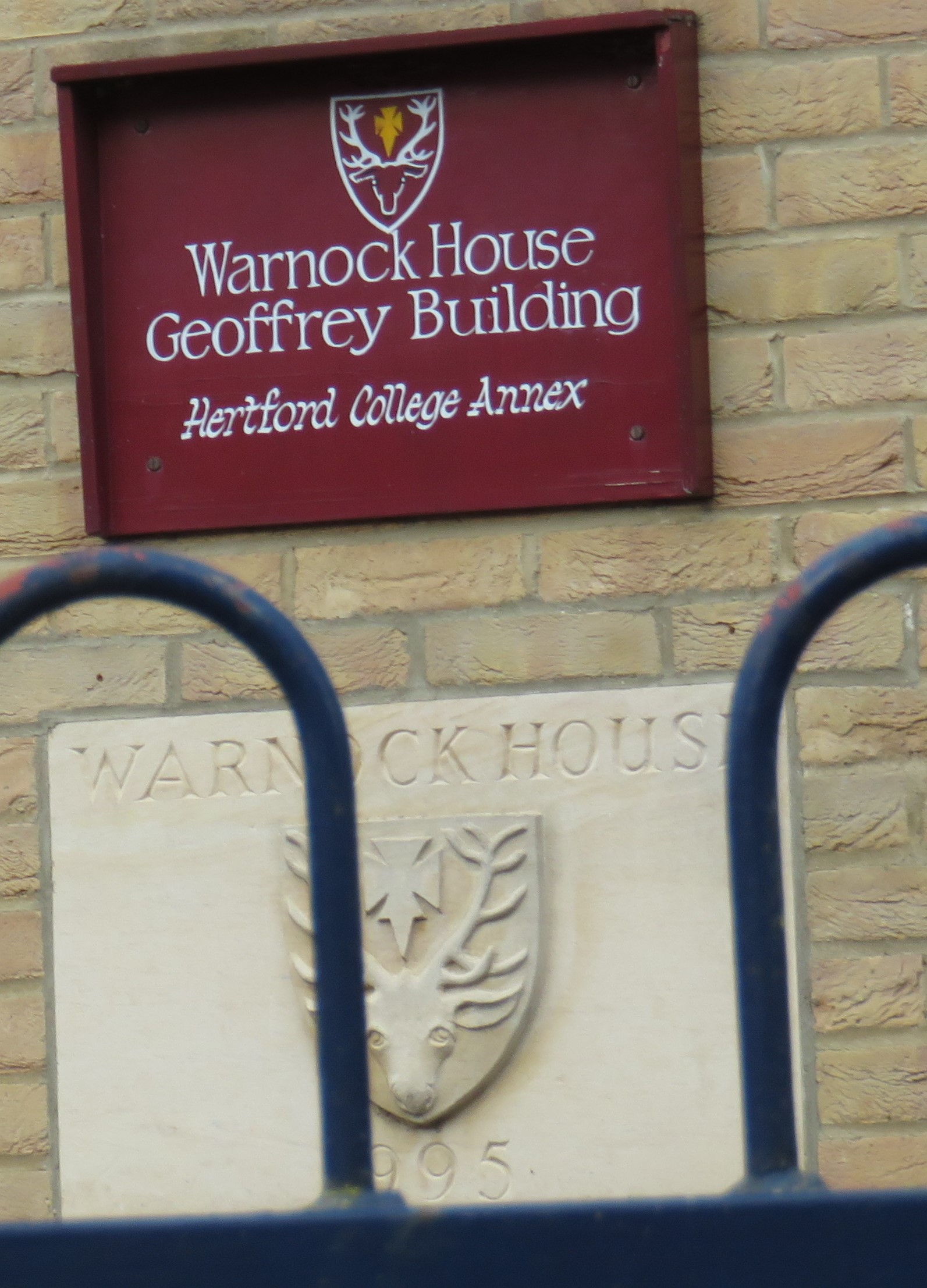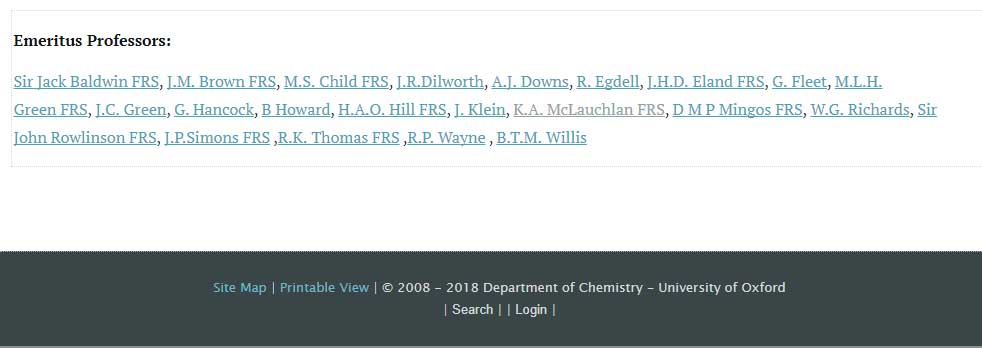Paul Dix (Brentwood School, annual day fees £19,800), Abbey National’s fast-tracked non-graduate senior manager, is not the only privately educated person to prove unhelpful.
There was Hertford College Oxford Principal Sir Geoffrey Warnock (Winchester College, £42,000), spouse of Dame Mary Warnock (St. Swithun’s Winchester, £21,000), who together with Hertford College chemistry tutor Dr. Keith McLauchlan (Queen Elizabeth Hospital Bristol, £15,000) chose to award Hertford’s open chemistry scholarship to Paul Rowlinson (St. Paul’s School Westminster, £26,000), son of Dr. McLauchlan’s boss Professor Sir John Shipley Rowlinson (Rossall School, £12,000).
Hertford College allocated their limited student accommodation preferentially to award holders, so my lack of an award had damaging consequences for me.

Hertford’s most recently built student accommodation is named after the Warnocks, which is ironic since they failed to provide student accommodation or provided it preferentially to the private school kids when they were in charge.
Warrington Grammar School headmaster Peter Martin Jackson (Perse School Cambridge, £18,000) was excessively keen that I should participate in the Oxford application process, locking me in the examination room when I arrived two hours late for an exam, and suggesting he could be vindictive if he didn’t get what he wanted.
The private school chaps hated me for getting better A-level grades than the private school kids, and despised my parents because neither of them was educated beyond the age of 14.
Going to university was my first experience of living away from home. It’s not surprising that I had an unhappy time and underachieved badly in my finals. They trashed the one advantage I had in life, my ability to perform academically better than the high status kids. There were no resits allowed. My heart was set on a career in academic science. Jackson, Warnock and McLauchlan between them killed my dreams. They killed my confidence for years after.
Warrington’s school headmaster Jackson (Cambridge) and Oxford’s chemistry tutor now emeritus professor McLauchlan (Bristol) each graduated from university in the town where they had been at private school. They didn’t know what it was like to leave a northern working class home to go to Oxford. They didn’t even know what it was like to leave home to go to university, the useless cretins.
Abbey National Building Society’s Finance Systems Manager Paul Dix summoned me to his office. It was to tell me he was breaking my contract of employment. “This appointment is subject to a probationary period of normally three months with regular reviews”, my contract said. Personnel had confirmed completion of my probation in February, and I had no more probationary reviews. Then one day in June, after a four month gap, Mr. Dix told me that I was back on probation with the threat of dismissal from my analyst programmer job. He advised me to take solace in alcohol. “Get drunk”, he said.
The Conservative government had recently changed employment law to remove security of employment in the first two years of employment, so I thought he could probably get away with it.
I didn’t know Paul Dix’s background. He might have had an MBA from INSEAD or the London Business School for all I knew. It turns out he is the same age as me, but doesn’t have a university qualification at all.
Paul Dix does have an education from Brentwood School (Day fees £19,800 p.a.). In other words, unlike my parents, neither of whom was educated beyond the age of 14, his family was wealthy enough to send him to private school.
So much for my A-level grade “A”s and my degree from Hertford College, Oxford University. The private school guy with no university education got to tell the Oxford graduate he was under qualified.
The goalposts of my revived probation kept changing, and it was obvious Paul Dix and his undermanager wanted to renege on the appointment. They offered me a lower grade, which I accepted. However Abbey National accused me of vexatious use of the grievance and dismissed me in a lengthy (several years) process after I appealed.
Abbey National had an education scheme in which employees were encouraged to study for a Diploma of Management Studies. I enrolled on a place at one of Abbey’s recommended colleges, Nene College in Northampton, and was accepted into the scheme by the Abbey National education and development department, but when reviving the probation Mr. Dix nixed my DMS too.
I still wonder what it was about my A-level grade “A”s, and my Oxford degree, that persuaded Mr. Dix it wouldn’t be worth Abbey National investing in a DMS course for me. It was a humiliation too far. It’s a pity because I’m sure I could have done good work for Abbey National if I had been treated with some equity.
I wasn’t around when Abbey National collapsed after unwise commercial lending. It turns out the company wasn’t overburdened with competent management after all.

On the safe side – currants and raisins
My mother lived through famine in Greece caused by the German occupation in 1941. A quarter of a million people died from starvation. She didn’t speak much about the experience.
A passage on “Famine Mentalities” from Mark Mazower’s book “Inside Hitler’s Greece”, p. 43, describes how some attempted to survive: “Many felt they were engaged in a personal struggle for their life with Charon, the personification of death in the public imagination. The war had given this vivid and commonly encountered motif of the Greek oral tradition a new immediacy. “Buy raisins. A handful will save you from Charon!” shouted the hawkers as they trudged around the suburbs, and it was common to see pedestrians chewing compulsively on a handful of currants.”
In case of food shortages said to be threatened if we have the wrong kind of Brexit, I bought a bag of each – currants and raisins. According to the origin of production labelling on the packaging, Waitrose source both from Australia. I’m beginning to believe I just might be ok.
 To Will Hutton, Principal of Hertford College (via email, 16 Aug 2018):
To Will Hutton, Principal of Hertford College (via email, 16 Aug 2018):
Dear Mr. Hutton,
Professor Keith McLauchlan, former Chemistry Fellow, writes in the document “50 YEARS OF THE TANNER REVOLUTION IN HERTFORD AND OXFORD ADMISSIONS”, downloadable from the Hertford College website: “Hertford operated a uniquely progressive admissions system, so progressive that other (Oxford University) colleges consistently attempted to expel us from the system.”
What was “progressive” about awarding the chemistry “open” scholarship in my year to Paul Rowlinson, son of Professor Sir John Shipley Rowlinson, Oxford University’s “Dr Lees” Professor of Chemistry? With three A-level grade “A”s, and neither of my parents educated beyond the age of 14 (my mother’s school education ended when she was 12, because of the German occupation of Greece in April 1941), why did I deserve only a “place”? My status compared with that of Paul Rowlinson, the Oxford chemistry professor’s son, the only other chemistry student, was already low. The destination of the scholarship award diminished the relative status I felt from “worm” to “disposable garbage”.
Did Hertford’s “progressive” credentials mean that an arrangement looking so much like nepotism was fine, when it might have been unacceptable at a more conservative college or institution? Perhaps it’s because like the professor’s son, I have an unusual connection with chemistry. I was born and lived to age twelve in a council house built by Warrington Borough Council in Sankey Bridges on a Leblanc Process chemical waste tip, with arsenic, lead, nickel, mercury, chromium, copper, cadmium, and polycyclic aromatic hydrocarbons contaminating the soil; and he was the chemistry professor’s son. Was I privileged in that way in Hertford’s estimation?
My Oxford entrance experience has similarities with those stated in the “Tanner Revolution” document by Kath Cates, who didn’t know there was a “Tanner Scheme” until recently, and Jeremy Bentham, whose school principal almost physically forced him to apply. My school head, P.M. Jackson, locked me in the library to sit the mathematics paper when I arrived two hours late, and then behaved in a weird and disturbing manner. I believe he wanted prestige for the school my father had been unable to attend for reasons of poverty a few decades earlier. If I’d known Hertford College had been threatened with expulsion because of its admissions policy I doubt I would have applied or accepted a place.
Hertford College allocated its subsidised college accommodation preferentially to scholarship holders, like the professor’s son, though he didn’t need it because he lived with his father. I was a contemporary in Oxford of prime ministers Blair and May. Their Oxford colleges provided them both with college accommodation. They don’t know how privileged they were. Not surprisingly I had a difficult time at Oxford, and underachieved badly, leaving with an “unclassified” degree. Dr McLauchlan wrote “It is a real pity that things conspired to cause you to do much less well than you should have – with your ability you should have been at the other end of the school – but there it is and we must accept the situation.” I’d have had a better outcome if I’d taken my grade “A”s to Manchester University, who offered me a university place closer to home. I look at the Nobel prizes won by Manchester University in recent years (1993 for work on DNA, and 2010 for graphene), and have no doubt, that could have been me!
My Dad spoke many times about the War, but only once about killing. That was when I rang him from the telephone box in the Hertford JCR, to tell him I was intending to leave without completing the post-finals year. “I shot my first German when I was your age” he said. Of course he was right. If I could advise my young adult self, I would say, do the minimum work to collect the inevitable third class degree, and use the resources available in Oxford to try different things outside of academic science, and avoid self-harm, obviously. A mentor with my actual interests at heart might have helped me salvage something positive from the Oxford experience. My impression was that the authorities at Hertford would have preferred me to go away and die, provided it wasn’t on the premises.
Inevitably the experience damaged my subsequent career prospects. I didn’t have anything like the career I believe my A-level grade “A”s deserved. I was employed by retail banks TSB and Abbey National for twenty years, and my peak salary was just over £22k. I could only dream of an academic’s status and salary. Meanwhile, Professor Keith McLauchlan and Professor Sir John Shipley Rowlinson are both currently on Oxford’s list of 21 chemistry emeritus professors, until they die, I think.
I would like to feel proud of having gone to Hertford, like some people, (the Hertford Festival lectures were excellent), but I actually feel shame, because I allowed myself to be bullied, tricked and humiliated, and was subsequently unable to convert my outstanding school academic results into a career. Don’t you think Hertford College should feel ashamed at the outcome I endured? With the possible exception of Paul Rowlinson himself, everybody got what they wanted, apart from me.
Sincerely,
Phil Chippendale
(Chemistry 1973)
Will Hutton is also a former board member of the Scott Trust, owner of the Guardian Media Group.
Note: Professor J.S. Rowlinson died recently (aged 92).
(Or how I lost a million pounds I never had).

Trade with Gox and lose the lot.
Until the beginning of 2013 I worked with Michael Taylor, who was a manager and promoter of stand-up comedians, specialising in representing Scandinavian and other foreign performers in the UK. His career developed with his friendship with Magnus Betnér, and progressed via his directorship of Comedy Café Management. By the beginning of 2013 he had established a very promising reputation in the industry.
From the time he started out in comedy management I was his primary assistant. He was very much the driving force behind the organisation, but I believe I brought some useful qualities to the party. I had been active on the open-spot stand-up circuit, especially in the mid to late 1990s, so I was known by several people who subsequently became established. They may not necessarily have liked me or my performance style, but they knew who I was. I brought my experience to the enterprise, which Michael with his considerable networking skills could exploit. He provided the social skills, I supplied the anti-social skills.
Then in mid-January 2013 Michael collapsed and was taken into hospital. For a few weeks I hoped he might eventually recover, but it became apparent that it wasn’t going to happen. The diagnosis was advanced oesophageal cancer. Additionally the episode had caused a brain injury, which appeared very like the vascular dementia my mother had. I had been my mother’s principal carer for a few months before her condition deteriorated. I visited Michael a few times in Kettering Hospital, and it was heart-breaking to see him, a physically and mentally very active man a decade younger than me, in that condition.
The tenth anniversary of my mother’s death fell in April, and I visited her grave in Warrington on the occasion. With the emotion of that anniversary, and the emotion of losing the Michael I knew before his illness, it was in retrospect not a good time to attempt rational decisions of any kind. I succeeded in becoming the April Fool of 2013.
At the beginning of April 2013 I owned a quantity of bitcoin in a Bitcoin Armory setup. Armory was open source software which ran in two environments, online and offline. I used an old Windows XP PC to run the offline version, and the online version was on my Internet connected PC. It was a very secure setup. It didn’t matter that Windows on the offline PC was not secure, the PC was there to provide “cold storage” and would never be connected to the Internet. To transfer out bitcoin I had to fire up the cold storage PC, copy the encryption keys onto a USB stick, transfer it to the online PC, and then make the transaction via the Internet.
That’s how I transferred all my bitcoin to the MTGOX Bitcoin exchange in April 2013, where I sold the whole lot. Worse, I didn’t get my cash out of the exchange before it collapsed at the beginning of 2014. After that, I didn’t want to think or talk about Bitcoin any more, for fear of being ridiculed by two sets of people, those who said that everything to do with Bitcoin was a fraud, and those (admittedly fewer at the time) who said I should have stuck with Bitcoin. Furthermore I only had myself to blame for failing to perform due diligence on the clown-car of an organisation that was MTGOX.
The amounts involved were pretty substantial. At the beginning of April 2013 I owned a three figure amount of BTC in my cold storage Armory wallet. If I’d sold 90 percent and kept the rest I’d still be substantially better off than I am now. My life would be somewhat less hand-to-mouth. As it is, I’ve lost all the speculative cash I got together to invest in Bitcoin in 2012. I may or may not get something back, depending on the workings of the Japanese bankruptcy courts.
Close but no e-cigar.
Keith McLauchlan, former Chemistry Fellow, writes on the Hertford College website:
“Hertford operated a uniquely progressive admissions system, so progressive that other (Oxford University) colleges consistently attempted to expel us from the system.”
What was progressive about awarding the chemistry “open” scholarship in my year to Paul Rowlinson, privately educated son of Professor Sir John Shipley Rowlinson, Oxford University’s “Dr Lees” Professor of Chemistry? With three A-level grade “A”s, and neither of my parents educated beyond the age of 14, why did I deserve only a “place”? Why did Hertford not acknowledge my state school achievements?
I fear Dr McLauchlan perceived it, perhaps unconsciously, against his interest to prevent the situation where “things conspired” to sabotage my career. It could have been embarrassing to him if I, the only other chemistry student, performed better than his faculty’s professor’s son, when the latter had been awarded the scholarship.
Dr McLauchlan’s own career progressed subsequently. K.A. McLauchlan and Sir John Rowlinson are both currently named among Oxford’s list of twenty or so “Emeritus Chemistry Professors”.

Hertford’s website explains in the same document that “Hertford’s initiative challenged the status quo and was unpopular with vested interests”. It was certainly against my vested interests. I gave up a place at Manchester to take the one at Hertford. Manchester made the same offer as Hertford, (two “E”s at A-level, I achieved three “A”s). I look at the Nobel prizes won by Manchester University in recent years (1993 for work on DNA, and 2010 for graphene), and have no doubt, that could have been me! Why not?
If I’d taken the place at Manchester and had the kind of accommodation problems I suffered in high-rent Oxford (Hertford allocated its own accommodation preferentially to scholarship holders), I could have commuted from my parents’ home in Warrington. I am sure I wouldn’t have had the career-destroying final examination outcome I had in Oxford.
Hertford College’s “progressive admissions system” only progressed the college’s interests at my expense.
I saw Ken Dodd on two occasions 34 years apart – once with my parents at the Winter Gardens in Blackpool in 1969, and once with a friend (Mike D.) at the Parr Hall Warrington on 30th December 2003. I think the new year’s eve’s eve show was an annual event, Warrington being conveniently just up the road from Liverpool. I went in 2003 when I was temporarily living back in Warrington after my mother died.
The Blackpool show was a mere two hours I think, but the event at the Parr Hall kicked off with a sold-out audience at 7.30pm, and continued on well after midnight, with the audience decimated by fatigue and the constraints of public transport hour by hour.
I’d recently watched “Goodfellas” on DVD and it amused me to find that one of his gags was one told by “King of the one-liners, Henny Goodman” in the Goodfellas cabaret scene. I suppose if you live long enough, you get legitimately to inherit everybody else’s material.
For extreme nostalgia, I watched on youtube the 1963 interview with Gay Byrne of Ken Dodd and the Beatles, at the Granada Studios for “Scene at 6.30”. Ken Dodd was 36 and John Lennon was 23, and there’s some highly entertaining 60’s banter.
So that’s another connection to childhood memories gone into history, like Arthur Askey and, almost, George Formby. Never much cared for Ken’s singing though.

Sunset over the Mersey estuary

Oxford University
Faiz Siddiqui, a former student of Brazenose College, Oxford, is suing Oxford University because “negligent teaching” caused him to underachieve in his final exams, damaging his subsequent career. I can sympathise.
Mr. Siddiqui was awarded a second class degree, when he expected a first. I left Oxford with an unclassified degree, when I might reasonably have expected a first. The letter from Hertford College stating my finals results admits as much. “With your ability you should have been at the other end of the school” it says, and “things conspired to cause you to do much less well than you should.” It doesn’t say to what extent Hertford College caused or could have prevented those circumstances.
Staff at Hertford College may have perceived it to be in their interests to neglect my academic progress. The only other chemistry student in my year, awarded the college’s only chemistry scholarship, was the son of one of Oxford University’s own chemistry professors. How would the Professor have reacted if the son underachieved and I didn’t?
I didn’t know until recently that other Oxford University colleges threatened to expel Hertford College from their common system because of its student recruitment policies (the Tanner Scheme). Hertford claims on its website that “Hertford’s initiative challenged the status quo and was unpopular with vested interests”, but I believe it was unethical. Hertford’s student recruitment depended on encouraging state school headmasters to bully or otherwise persuade students to apply for admission to Hertford straight from school. Today many academic institutions encourage students to take a gap year. Instead my own school headmaster behaved weirdly and inappropriately and caused me to believe he could be vindictive if he didn’t get what he wanted, encouraged I believe by Hertford College.
Neither Hertford College nor my Warrington state school told me that Hertford’s recruitment methods were anything but traditional. My father’s education ended at age fourteen, my mother’s at twelve, they couldn’t advise me.
Giles Coren wrote of Faiz Siddiqui “If you want to be taught and pass exams and become a lawyer, don’t you go to a red brick? Or Cambridge? Oxford is for drinking and playing tennis and nicking books out of the Bod under your cricket jumper and lobbing them at punting tourists from Magdalen Bridge.” It’s a pity for me he wasn’t around to advise me. If I had taken the year out, which I wanted, no doubt I would eventually have gone to Manchester or Cambridge.
Almost ten years after I left Oxford University, a senior manager at TSB Bank, where I was employed, told me I couldn’t be promoted on an already restricted career path, commenting “you had trouble at university, didn’t you?” Those people who say your university record doesn’t matter after ten years are not telling the truth.
Hertford College cheated me out of the career my A-level grade “A”s deserved. I’d be happier and more successful in a career and in my relationships, and I’d have avoided much unpleasantness, but for Hertford College, Oxford.

Benazir Bhutto
I’ve met three people subsequently murdered by terrorists in three different countries.
John Stevenson was Treasurer of TSB Bank Computer Division (Wythenshawe) Sports and Social Association. I was secretary of the same club, though not at the same time. He was killed with his wife and two daughters in the Pan Am Flight 103 (Lockerbie) bombing on Dec 21, 1988.
I met Benazir Bhutto, who twice became Prime Minister of Pakistan, at the Oxford Union in 1974. She was assassinated in Rawalpindi on 27 December 2007.
Andreas Liveras was at a Greek Orthodox Christian community social event I attended in 2000. He was in India on business when murdered by terrorists in the Mumbai massacre on 27 November 2008.

My father couldn’t spell “Italian” but he was meticulous when dealing with mines and booby traps. His commanding officer had a different skill set. He could spell “Italian” but was killed by a butterfly mine.
“I shot my first German when I was your age” is what my father said when I told him I was leaving Oxford. He occasionally told stories about the War, but that was the only time he said anything about killing.
I had discussed Oxford with him when I was still at school. “You’ll make a good chemist” he said. Based on my school academic record, that seemed obvious. I doubt he knew about my school headmaster locking me in the examination room after I arrived late for the entrance exam, and the headmaster’s subsequent weirdness. I didn’t tell my father, and I doubt my mother said anything. My father left school at fourteen, and my mother at twelve, so they didn’t have the information to advise me academically.
Dad was right, though. If I’d been able to take a detached, unemotional view, I’d have put in the minimum laboratory work to pick up my third class degree, and used the time to try whatever Oxford had to offer. If Oxford University had somebody to mentor me, and who was on my side, that attitude might have been sold to me.
I panicked. Going straight to Oxford from a working class background seemed like a terrible mistake. If I had taken a year out, I’d be collecting my first class degree, or at worst a very good second, from Manchester, or perhaps a suitable Cambridge college, at the same time I was due to collect my third class degree after four years of chemistry at Oxford. I was distraught. I felt the need to get out and correct the mistake as soon as possible, although rationally it was never likely to be possible. Window punching was definitely not a rational response.
The chemistry tutor at Hertford College showed no apparent interest in encouraging me to stay. I only spoke to him very occasionally after my finals humiliation. Perhaps he was embarrassed about Hertford College’s chemistry open scholarship having been awarded to the Oxford University chemistry professor’s son, when I, the only other chemistry student, received just a place, in spite of my three A-level grade “A”s. His only encouragement – “In ten years’ time, you’ll wonder what you were worried about”, he said.
He amongst others have described Hertford as a “progressive” Oxford college, as does Hertford College’s promotional literature. What was so progressive about awarding the college’s only chemistry scholarship to the Oxford University chemistry professor’s son?